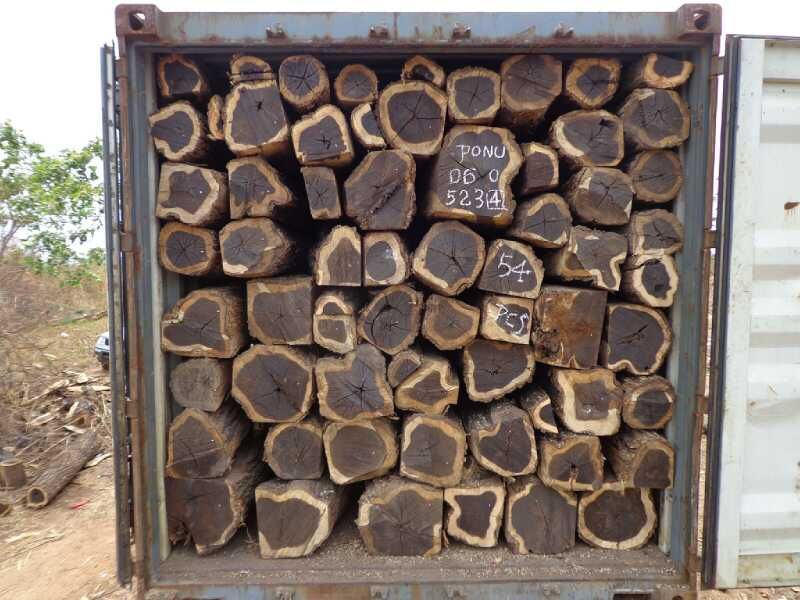

FOB Price
Get Latest Price( Negotiable )
|20 Cubic Meter Minimum Order
Country:
Ghana
Model No:
-
FOB Price:
( Negotiable ) Get Latest Price
Place of Origin:
-
Price for Minimum Order:
-
Minimum Order Quantity:
20 Cubic Meter
Packaging Detail:
Round Logs inside 20ft container
Delivery Time:
15 days after confirmation of Letter of credit or
Supplying Ability:
100 Cubic Meter per Month
Payment Type:
L/C, T/T
Product Group :
Ghana
Contact Person Mr. Nana
47 Mensah Wood St., East Legon, Accra
Color/Appearance: Often completely black, with little or no discernible grain. Occasionally slightly lighter, with a dark brown or purplish hue. The pale yellow sapwood is usually very thin, and is clearly demarcated from the darker heartwood.
Grain/Texture: African Blackwood has a fine, even texture, with small pores that should not require filling; the grain is typically straight.
Endgrain: Diffuse-porous; medium to large pores in no specific arrangement; solitary and radial multiples of **3; dark brown deposits present; growth rings may be distinct due to marginal parenchyma; parenchyma banded (marginal), apotracheal parenchyma diffuse-in-aggregates, paratracheal parenchyma can also be vasicentric, and aliform (winged); narrow rays, spacing normal.
Rot Resistance: Heartwood is rated as very durable in regards to decay resistance, though only moderately resistant to insect attack. The sapwood is commonly attacked by powder-post beetles and other borers.
Workability: Very difficult to work with hand or machine tools, with an extreme blunting effect on cutters. African Blackwood is most often used in turned objects, where it is considered to be among the very finest of all turning woods—capable of holding intricate details, and is reported to hold screw threads nearly as well as metal.
Odor: African Blackwood has a mild—though distinctive—scent while being worked.
Allergies/Toxicity: Although severe reactions are quite uncommon, African Blackwood has been reported as a sensitizer. Usually most common reactions simply include eye, skin, and respiratory irritation. See the articles Wood Allergies and Toxicity and Wood Dust Safety for more information.
Sustainability: This wood species is not listed in the CITES Appendices, but is reported by the IUCN as being near threatened. Technically it doesn’t meet the Red List criteria of a vulnerable or endangered species, but is close to qualifying and/or may qualify in the near future.
Common Uses: Musical instruments (guitars, clarinets, oboes, etc.), inlay, carving, tool handles, and other turned objects.
Comments: To be considered the original ebony, African Blackwood was imported and used in Ancient Egypt thousands of years ago. Even the name “ebony” has an Egyptian derivation as “hbny”—which has been shown to refer to primarily to Dalbergia melanoxylon, rather than the species which are considered to be ebony today: such as those in the Diospyros genus. In addition, African Blackwood is technically in theRosewood genus (Dalbergia), and is more stable and resistant to movement and warping than other types of ebony.
African Blackwood is considered to be among the hardest and densest of woods in the world; indeed, among some **5 species tested, (including Lignum Vitae), Gabriel Janka originally found African Blackwood to be the very hardest. Unfortunately, many online sources list African Blackwood’s Janka hardness at only ~***0lbf—which seems very unlikely given its confirmed specific gravity.
| Country: | Ghana |
| Model No: | - |
| FOB Price: | ( Negotiable ) Get Latest Price |
| Place of Origin: | - |
| Price for Minimum Order: | - |
| Minimum Order Quantity: | 20 Cubic Meter |
| Packaging Detail: | Round Logs inside 20ft container |
| Delivery Time: | 15 days after confirmation of Letter of credit or |
| Supplying Ability: | 100 Cubic Meter per Month |
| Payment Type: | L/C, T/T |
| Product Group : | Lumber |